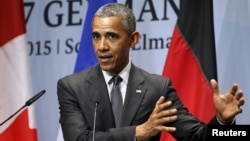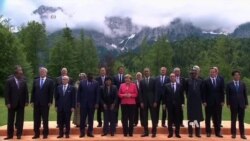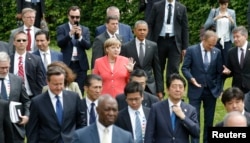The leaders of seven of the world’s most powerful countries agreed on Monday to toughen sanctions on Russia, if necessary, to press for a political solution to the conflict in eastern Ukraine.
At the annual Group of Seven (G-7) summit, the leaders said current sanctions will remain in place until Russia helps to fully implement a peace plan agreed to in February in Minsk, Belarus.
That indicates that the European members of the group will support the extension of key European Union sanctions at their summit this month.
The G-7 communiqué warned, “we also stand ready to take further restrictive measures in order to increase [the] cost on Russia should its actions so require.”
(Read G-7 Leaders' Declaration here )
A brief offensive by Russian-back separatists last week raise new concerns about the sincerity of Russia’s commitment to finding a political solution.
U.S. President Barack Obama said, “Russian forces continue to operate in eastern Ukraine, violating Ukraine’s sovereignty and territorial integrity.”
He said existing sanctions have crippled the Russian economy, and he said Russian President Vladimir Putin has to decide whether to “continue to wreck his country’s economy and continue Russia’s isolation in pursuit of a wrongheaded desire to recreate the glories of the Soviet Empire.”
Obama said, “Russia’s greatness does not depend on violating the territorial integrity and sovereignty of other countries.”
Related video report by VOA's Luis Ramirez:
Not invited
Russia was suspended from what used to be the Group of Eight last year because of its occupation and annexation of Ukraine’s Crimea region, and its support for separatists in eastern Ukraine.
The remaining G-7 leaders pledged to increase support for Ukraine’s reform and economic growth efforts, but did not say anything about military aid, which some G-7 nations provide on a bi-lateral basis.
John Hudson, a senior reporter with Foreign Policy, said U.S. officials met their goals of maintaining sanctions.
"They succeeded in convincing the Europeans that sanctions against Russia need to be extended," he said. "These sanctions were set to expire, and there are a number of European countries, particularly Italy and Greece, who are a little bit skeptical about the need to keep sanctions in place.
"And, the U.S. effort to convince them that those [sanctions] are important seemed to win out at the end of the day with a statement that came out," he said.
As to the issue of military aid to Ukraine, James Nixey, head of the Russia Eurasia Program at Chatham House in London, said the choice is complex.
“I think, in truth, it’s a very difficult decision no matter what decision you make," he said. "There are very good arguments for and against supplying Kiev with weapons.
"The argument for...is that one needs to level the playing field for insurrection and aggression, that Ukrainian soldiers are dying and need our protection," he said. "You can only give them protection by giving them both defensive and offensive weapons, which would actually limit the deaths of Ukraine’s forces.
"There is, however, a counter-argument – I’m not necessarily saying I maintain it myself but If we flood Ukraine with weapons, we risk ramping up the war to an uncontrollable scale,” he said.
Islamic State, Boko Haram
The G-7 group also addressed the threats from the militant groups Islamic State and Boko Haram, meeting Monday with leaders from Iraq, Tunisia and Nigeria.
The G-7 leaders also called on all nations to fight human trafficking, which is creating a refugee crisis in some of Europe’s Mediterranean countries, and to work to establish a national government in Libya to help stem the flow of refugees.
Climate change, economic growth
Much of the summit communiqué was devoted to issues like climate change, global health and economic growth. The leaders pledged to work toward finishing trade agreements they say will contribute to sustainable growth.
They pledged to increase aid to developing countries, and to pursue strict emissions control targets at the global climate change conference in France in December. They want $100 billion spent every year by governments and businesses to reduce emissions.
They plan to increase African countries’ ability to develop renewable energy sources. And they made a commitment to work with 60 countries to improve healthcare and avoid epidemics like the recent Ebola outbreak in West Africa.
Expanded opportunities for women
The G-7 committed to lift 500 million people out of hunger and malnutrition by 2030. And based largely on an initiative by the summit host, German Chancellor Angela Merkel, the leaders promised to expand opportunities for women to gain the knowledge and skills they need to provide for their families. They want one third more women to have a vocational education by 2030.
Casual observers often dismiss the long list of G-7 pledges, but the global G8 Research Group says the leaders tends to fulfill about 75 percent of their pledges, and made 82 percent in the past year. The group’s director, Professor John Kirton of the University of Toronto, told VOA, “They do tend to keep the promises they collectively make.”
“The G-7 still controls the overwhelming share of the capabilities that count,” Kirton said. “Overwhelmingly, it’s G-7 currencies that are used every second of every day in international transactions and trade. And when you need to engage in military intervention to stop aggression, annexation, to stop genocide in Europe or elsewhere, it’s the G-7 that does the job.”
Kirton added, “It is still the only summit level global governance institution that has as its distinctive mission the global promotion of the values of open democracy, individual liberty -- that’s Human Rights -- and social advance. Those are the values we know that almost all of the citizens in all of the countries want. And the G-7 is the only club that is championing those, and making considerable success.”
Obama said the G-7 exists in part, “to stand up for the fundamental principles that we share as democracies, for freedom, for peace, for the right of nations and peoples to decide their own destiny, for universal Human Rights and the dignity of every human being.”
VOA's Jeffrey Young contributed to this report from Washington.







